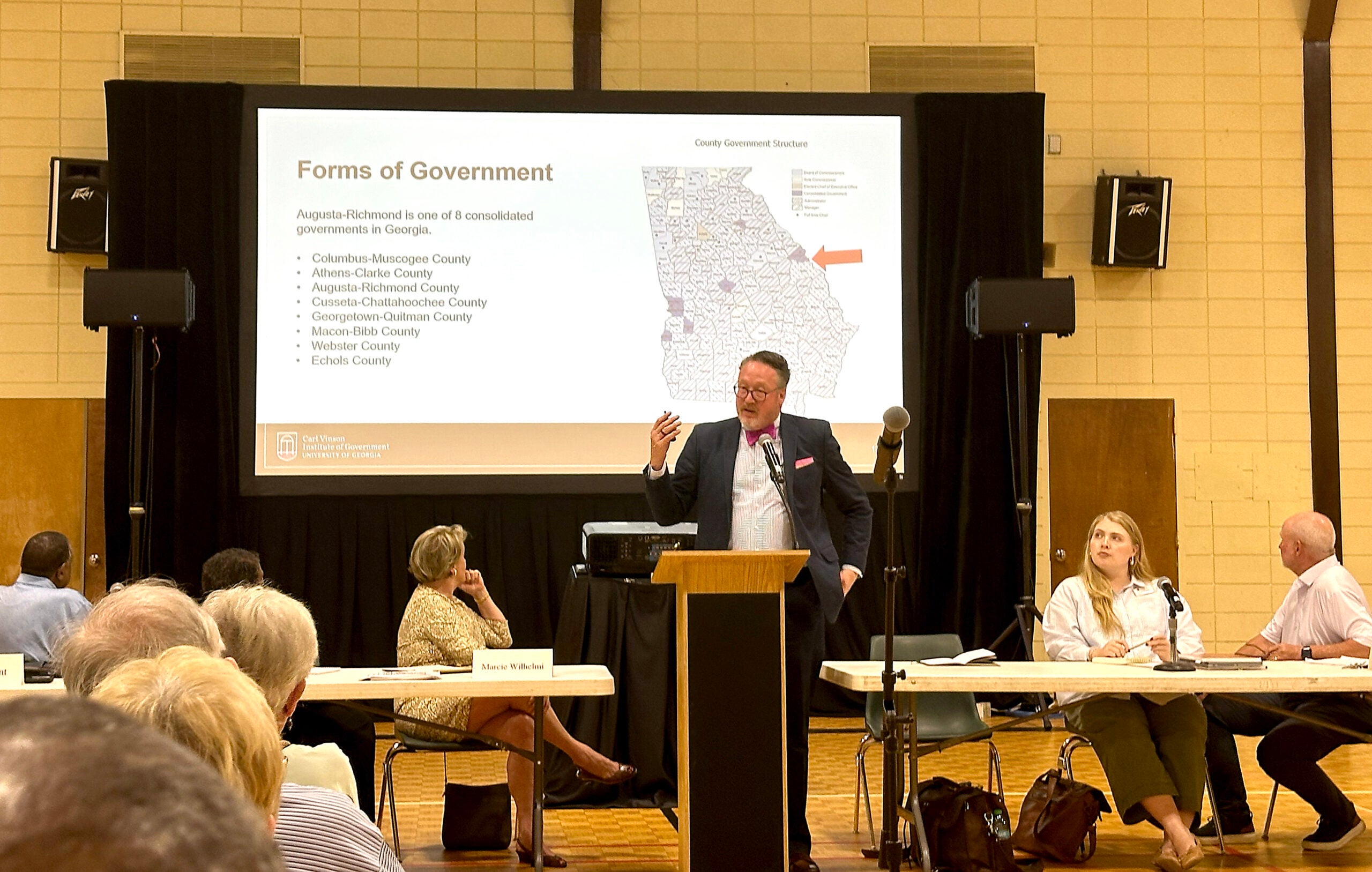Some 1,500 responded and just over 1,000 had their responses counted in a July survey of resident preferences for revising Augusta’s charter.
The results showed in several instances, many Augustans favor the status quo – keeping a mayor, an administrator and 10 commissioners elected by district. Some respondents said the questions were unclear. Many wrote in answers to the open-ended questions.
The Charter Review Committee conducted the survey with assistance from the Carl Vinson Institute of Government at the University of Georgia and reviewed results at its latest meeting Aug. 21.
The information-gathering survey used a “sample of convenience” drawn simply from those who chose to take it, UGA’s Rex Facer said. But it had enough respondents to reach above a 95% confidence level, he said.
Of those who responded, the most, 21.2%, said they lived in Augusta Commission District 3, while the second-most, 13.53%, lived in District 7. The lowest turnout was from District 6 at 4.73%, while more than 15% reported they did not know.
How many commissioners
The survey dealt with topics on which the committee presumably seeks input and may have opinions. While some on the committee have suggested reducing the number of Augusta commissioners, 54.88% of survey respondents liked the current number, 10. Another 28.7% thought 10 was too many and 16.43% said Augusta needs more.
Augusta-Richmond County is on the high end of Georgia local governments with 10 commissioners. While Atlanta has 15 representatives, Savannah and Chatham County each have six. Macon-Bibb has nine and Columbus-Muscogee and Athens-Clarke each have eight.
District-level or at-large elections
The survey asked if respondents wanted at-large, district- or district- and super district-level elections. Currently Augusta elects eight commissioners by districts and two super district commissioners from two super districts, comprised of four districts each.
Nearly 45% said commissioners should be elected by their district. Another 36.7% said they should be elected by “districts and/or super districts” Some 18.3% preferred all at-large commission elections.
Mayor or no mayor
Most Georgia cities have them and nearly 76% of survey respondents said yes, Augusta needs a mayor in addition to having commissioners. Almost 14% said Augusta does not need a mayor, while 10.43% were unsure.
While Augusta’s mayor gained a vote on all commission matters last year in a referendum, 43.67% of survey respondents said the mayor also needs a veto, in certain situations. Another 17.1% said the mayor needs unlimited veto power. Thirty-two percent said Augusta’s mayor needs no veto.
Administrator or city manager
The survey also asked if Augusta needs an administrator or city manager. The survey said Augusta’s administrator works for the mayor, which is not currently the case. Some 40.77% of survey respondents said they preferred the “current” administrator role while 37.1% wanted a manager.
Only 6.67% said Augusta needs neither, while 15.46% were unsure.
The charter committee has brought up changing to a strong manager form of government a few times but made no decisions.
Hiring and firing
Whether an administrator or a manager, 58.65% of respondents said he or she should be hired by the commission, which is roughly the practice now. Some 28.7% said the mayor should choose.
As for department heads, 55.46% said the “commission and the mayor” should have the power to hire and fire department heads. Only 29.57% said the administrator or manager alone should have that authority, while 8.7% gave it to the mayor.
Written responses
Over half the more than 300 written survey responses raised points about the powers of the mayor, commission and manager or administrator. Several wanted either the mayor or administrator/manager to have real authority. Others commented the commission was too large or plagued by gridlock, and that clearer lines of authority need to be drawn.
Dissatisfaction with the government’s performance was a major theme, Facer said. Some respondents expressed frustration, calling the city “dysfunctional,” with too many interim directors and too much political infighting. “Nothing gets done due to no one being in charge,” one said.
Others called for cooperation, working together or for commissioners to “do their jobs.” Some criticized commissioners for absenteeism, absentee voting or abstaining from votes.
Committee members questioned the survey’s low response rate, including some 499 respondents counted then marked as “skipped” taking answering the survey. Facer said it “appeared to be the case” that those respondents started then failed to complete the survey.











